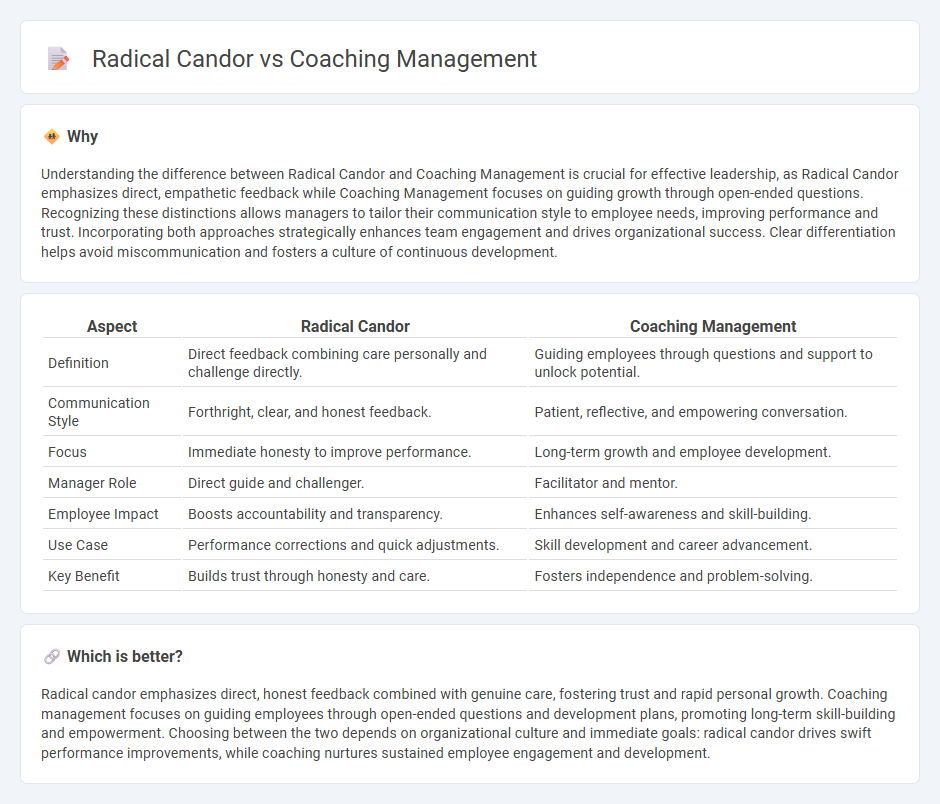
Radical Candor emphasizes direct, honest feedback paired with genuine care for employees' growth, fostering transparent communication and stronger workplace relationships. Coaching management focuses on guiding and supporting employees through questions and active listening to unlock their potential and enhance performance. Explore deeper insights into how these leadership styles transform team dynamics and drive success.
Why it is important
Understanding the difference between Radical Candor and Coaching Management is crucial for effective leadership, as Radical Candor emphasizes direct, empathetic feedback while Coaching Management focuses on guiding growth through open-ended questions. Recognizing these distinctions allows managers to tailor their communication style to employee needs, improving performance and trust. Incorporating both approaches strategically enhances team engagement and drives organizational success. Clear differentiation helps avoid miscommunication and fosters a culture of continuous development.
Comparison Table
| Aspect | Radical Candor | Coaching Management |
|---|---|---|
| Definition | Direct feedback combining care personally and challenge directly. | Guiding employees through questions and support to unlock potential. |
| Communication Style | Forthright, clear, and honest feedback. | Patient, reflective, and empowering conversation. |
| Focus | Immediate honesty to improve performance. | Long-term growth and employee development. |
| Manager Role | Direct guide and challenger. | Facilitator and mentor. |
| Employee Impact | Boosts accountability and transparency. | Enhances self-awareness and skill-building. |
| Use Case | Performance corrections and quick adjustments. | Skill development and career advancement. |
| Key Benefit | Builds trust through honesty and care. | Fosters independence and problem-solving. |
Which is better?
Radical candor emphasizes direct, honest feedback combined with genuine care, fostering trust and rapid personal growth. Coaching management focuses on guiding employees through open-ended questions and development plans, promoting long-term skill-building and empowerment. Choosing between the two depends on organizational culture and immediate goals: radical candor drives swift performance improvements, while coaching nurtures sustained employee engagement and development.
Connection
Radical candor enhances coaching management by fostering open, honest communication that builds trust and drives employee growth. Emphasizing direct feedback while maintaining empathy helps managers identify strengths and areas for improvement, leading to more effective development plans. Integrating radical candor into coaching creates a supportive culture where continuous learning and accountability thrive.
Key Terms
**Coaching Management:**
Coaching management centers on fostering employee development through continuous feedback, active listening, and personalized guidance to enhance performance and engagement. This approach prioritizes building trust and encouraging growth by addressing individual strengths and challenges without harsh criticism. Discover more about how coaching management transforms leadership and team dynamics.
Developmental Feedback
Coaching management emphasizes personalized guidance and skill-building to foster employee growth, while Radical Candor centers on direct, honest communication balanced with care to improve performance and relationships. Developmental feedback in coaching management is typically ongoing and tailored to individual learning needs, whereas Radical Candor delivers timely, candid insights that challenge employees to excel. Explore deeper distinctions and practical applications to enhance your leadership effectiveness.
Empowerment
Coaching management emphasizes empowering employees through personalized development plans and active listening, fostering growth and autonomy. Radical candor prioritizes direct, honest feedback combined with genuine care, creating an environment where employees feel both challenged and supported. Explore how blending these approaches can optimize empowerment and performance in your team.
Source and External Links
What Is Coaching? - Coaching management is a sophisticated style that develops employee confidence and competence by providing clear direction, improving performance, and establishing commitments aligned with organizational goals.
Coaching Management Style: Everything You Need to Know - This management style empowers employees through clear direction, continuous skill development, and fostering problem-solving, leading to better performance, job satisfaction, adaptability, and stronger team relationships.
Why developing a coaching management style is essential for managers - Coaching management creates psychological safety, empowers decision-making, encourages diverse perspectives, and enhances team engagement and productivity by building trust and open communication.
 dowidth.com
dowidth.com